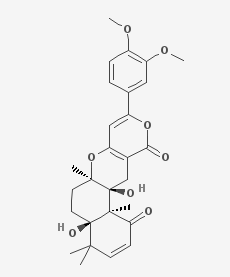Arisugacin A
Arisugacin A is a terpenoid compound that is derived from the fungus Penicillium citreonigrum. It is known for its potent inhibitory effects on acetylcholinesterase, an enzyme that is crucial for nerve function in the body. This makes Arisugacin A a potential candidate for the treatment of Alzheimer's disease.
Chemical Structure[edit | edit source]
Arisugacin A is a sesquiterpene derivative, which means it is composed of three isoprene units and has the molecular formula C15H24. It has a unique structure that includes a tetrahydrofuran ring, a characteristic that is rare among natural products.
Biosynthesis[edit | edit source]
The biosynthesis of Arisugacin A involves the cyclization of farnesyl pyrophosphate, a common precursor in the biosynthesis of terpenoids. This is followed by a series of oxidation and reduction reactions to form the final product. The exact biosynthetic pathway is still under investigation.
Biological Activity[edit | edit source]
Arisugacin A is a potent inhibitor of acetylcholinesterase, an enzyme that breaks down acetylcholine in the synapses of the nervous system. By inhibiting this enzyme, Arisugacin A increases the concentration of acetylcholine in the synapse, enhancing nerve impulse transmission. This property makes it a potential therapeutic agent for diseases characterized by a decrease in acetylcholine levels, such as Alzheimer's disease.
Therapeutic Potential[edit | edit source]
Due to its potent acetylcholinesterase inhibitory activity, Arisugacin A has been studied for its potential use in the treatment of Alzheimer's disease. In preclinical studies, it has shown promise in improving memory and cognitive function. However, further research is needed to confirm its efficacy and safety in humans.
See Also[edit | edit source]
Transform your life with W8MD's budget GLP1 injections from $125
W8MD offers a medical weight loss program NYC and a clinic to lose weight in Philadelphia. Our W8MD's physician supervised medical weight loss centers in NYC provides expert medical guidance, and offers telemedicine options for convenience.
Why choose W8MD?
- Comprehensive care with FDA-approved weight loss medications including:
- loss injections in NYC both generic and brand names:
- weight loss medications including Phentermine, Qsymia, Diethylpropion etc.
- Accept most insurances for visits or discounted self pay cost.
- Generic weight loss injections starting from just $125.00 for the starting dose
- In person weight loss NYC and telemedicine medical weight loss options in New York city available
- Budget GLP1 weight loss injections in NYC starting from $125.00 biweekly with insurance!
Book Your Appointment
Start your NYC weight loss journey today at our NYC medical weight loss, and Philadelphia medical weight loss Call (718)946-5500 for NY and 215 676 2334 for PA
Search WikiMD
Ad.Tired of being Overweight? Try W8MD's NYC physician weight loss.
Semaglutide (Ozempic / Wegovy and Tirzepatide (Mounjaro / Zepbound) available. Call 718 946 5500.
Advertise on WikiMD
|
WikiMD's Wellness Encyclopedia |
| Let Food Be Thy Medicine Medicine Thy Food - Hippocrates |
Translate this page: - East Asian
中文,
日本,
한국어,
South Asian
हिन्दी,
தமிழ்,
తెలుగు,
Urdu,
ಕನ್ನಡ,
Southeast Asian
Indonesian,
Vietnamese,
Thai,
မြန်မာဘာသာ,
বাংলা
European
español,
Deutsch,
français,
Greek,
português do Brasil,
polski,
română,
русский,
Nederlands,
norsk,
svenska,
suomi,
Italian
Middle Eastern & African
عربى,
Turkish,
Persian,
Hebrew,
Afrikaans,
isiZulu,
Kiswahili,
Other
Bulgarian,
Hungarian,
Czech,
Swedish,
മലയാളം,
मराठी,
ਪੰਜਾਬੀ,
ગુજરાતી,
Portuguese,
Ukrainian
Medical Disclaimer: WikiMD is not a substitute for professional medical advice. The information on WikiMD is provided as an information resource only, may be incorrect, outdated or misleading, and is not to be used or relied on for any diagnostic or treatment purposes. Please consult your health care provider before making any healthcare decisions or for guidance about a specific medical condition. WikiMD expressly disclaims responsibility, and shall have no liability, for any damages, loss, injury, or liability whatsoever suffered as a result of your reliance on the information contained in this site. By visiting this site you agree to the foregoing terms and conditions, which may from time to time be changed or supplemented by WikiMD. If you do not agree to the foregoing terms and conditions, you should not enter or use this site. See full disclaimer.
Credits:Most images are courtesy of Wikimedia commons, and templates, categories Wikipedia, licensed under CC BY SA or similar.
Contributors: Prab R. Tumpati, MD



